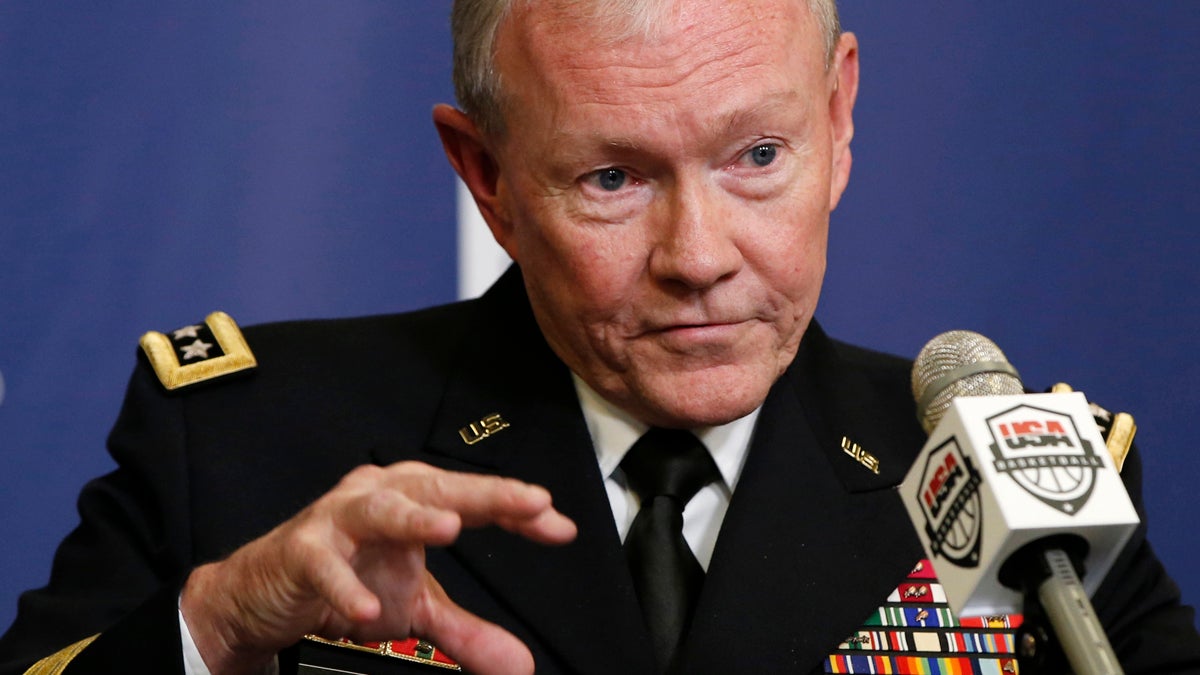The ISIS crisis: Here we go down the slippery slope

Joint Chiefs Chairman Gen. Martin Dempsey, Aug. 20, 2014 (Kathy Willens/AP Photo, file)
Well, that certainly didn’t take long. Less than a week after President Obama slammed the door on sending ground troops to fight ISIS (“American forces will not have a combat mission”), his top military guy went to Capitol Hill and swung the door open.
So here we go down the slippery slope, otherwise known as “mission creep.” Already.
That’s how it looks, anyway. The president seemed to say one thing last Wednesday night – but General Martin Dempsey, chairman of the Joint Chiefs of Staff, seemed to say another thing yesterday morning. If only members of the Obama team would sing from the same sheet, then maybe the public would feel more confident about the mission against ISIS. (Or the war against ISIS. Obama teammates can’t even agree on what to call it.)
In last week’s address, Obama repeatedly ruled out ground troops – including “we will not get dragged into another ground war in Iraq” and “it will not involve American combat troops fighting on foreign soil” – but yesterday, Dempsey was not nearly as definitive as the boss to whom he is supposedly subordinate. The general told a Senate committee that, for now at least, Obama’s coalition of nations seems fine – “but if it fails to be true, and if there are threats to the United States, then I, of course, would go back to the president and make a recommendation that may include the use of U.S. military ground forces.”
ISIS is already making verbal “threats to the United States,” so Dempsey has carved himself a big loophole. And he basically said that we’ll have American personnel fighting on the ground in the near future anyway. Obama said last week that he was sending hundreds of “advisers” to help train the (heretofore untrainable) Iraqi army, and he made it (seemingly) clear that these advisers would stand back and let the army take the right to ISIS. But that’s not how Dempsey sees it.
Dempsey said yesterday, “To be clear, if we reach the point where I believe our advisers should accompany Iraqi troops on attacks against specific (ISIS) targets, I will recommend that to the president.” He would so recommend, “if I found that circumstance evolving.” He called it “close combat advising.” I call it boots on the ground, which is a potential precursor to far more boots on the ground.
Why do I say this? Because history.
And you have to wonder: Did the White House dispatch Dempsey to Capitol Hill, with specific instructions to give Obama some wiggle room on ground troops? The administration says no, that his remarks were not cleared by the White House. So apparently he feels free to freelance his opinions (thus potentially influencing public opinion), despite the fact that he supposedly serves at the pleasure of his civilian superiors.
And this was not the first time that Obama’s military chieftain has been more publicly hawkish than the president. Back in August, when the administration was clearly conflicted about fighting ISIS inside Syria, Dempsey got bellicose at a press conference, insisting that the administration needed to fight ISIS inside Syria: “Can they be defeated without addressing that part of their organization which resides in Syria? The answer is no.”
Clearly, there’s tension between the military and the administration on how to fight this mission/war/whatever it is. And in response to Dempsey yesterday, the Obama team went into spin-doctor overdrive. Civilian spokesmen at the National Security Council and the Pentagon press office insisted that the general “believes the current strategy to counter (ISIS) is appropriate,” and that he did not intend to prompt “a broader discussion of employing US ground combat units in Iraq.”
Meanwhile, White House press secretary Josh Earnest said yesterday that Obama’s policy remains the same, that he’s opposed to ground troops – and he defended Dempsey: “It’s the responsibility of the president’s military advisers to plan and consider all the wide range of contingencies.”
That’s fine, as far as it goes. But when a military adviser voices those contingencies so publicly, it potentially muddies the administration message and prompts a war-weary public to wonder who the heck is calling the shots.
Our civilian leaders are supposed to weigh the contingencies and call the shots. As Obama warned in a speech last spring, while referencing the recent past, “Some of our most costly mistakes came…from our willingness to rush into military adventures without thinking through the consequences.” He might want to bear that in mind.
——-
Update: Obama doubled-down today on “no ground troops.” For what it’s worth.
——-
Follow me on Twitter, @dickpolman1, and on Facebook.
WHYY is your source for fact-based, in-depth journalism and information. As a nonprofit organization, we rely on financial support from readers like you. Please give today.

